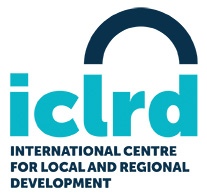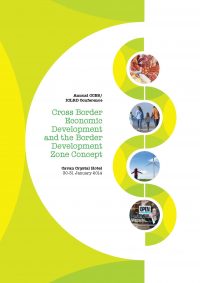The International Centre for Local and Regional Development (ICLRD), together with the Centre for Cross Border Studies, held its Ninth Annual Conference on 30-31 January 2014 at the Cavan Crystal Hotel in County Cavan. Attended by 110 delegates and speakers, the conference is part-financed by the European Union’s INTERREG IVA programme managed by the Special EU Programmes Body. The theme of this two-day event was Cross Border Economic Development and the Border Development Zone Concept. Speaker slides and audio files are available for download below.
While there is no longer an all-island Common Chapter, the Irish Government’s 2007-2013 National Development Plan (NDP) notes that the border “causes natural markets to fragment along territorial lines, reducing economic interaction and the opportunity to develop economies of scale and strong indigenous industries is lost. Firms tend to shun border regions and infrastructural links are not developed, resulting in unbalanced economic growth. Taking an all-island approach will help deliver more balanced regional development and address the negative effects of the border” (p.96).
The Towards a Border Development Zone (BDZ) action research project explores the potential of a joint economic development approach across the whole Irish and Northern Irish cross-border region. The idea for the Border Development Zone originated in a meeting of policy makers (including representatives of InterTradeIreland, Invest NI, Forfás, Enterprise Ireland and IBEC) in Newry in September 2011 to discuss the emerging findings of the Bradley & Best report, Cross-Border Economic Renewal: Rethinking Regional Policy in Ireland, which was commissioned by the Centre for Cross Border Studies (CCBS).
Day 1 – January 30, 2014
14.00 Welcome Address
Mr. John Driscoll, Director, ICLRD
Ms. Ruth Taillon, Director, Centre for Cross Border Studies |
 |
 |
Session 1: Local Government as Drivers of Territorial Cohesion
| 14.20 Introduction to Session Ms. Ruth Taillon, Director, Centre for Cross Border Studies |
|
|
| 14.25 Integrating Territorial Cohesion and the Economic Agenda: The Role of Local and Regional Government in Cross-Border Cooperation Dr. Joachim Beck, Director, Euro-Institute, Kehl, Germany This will focus on the period 2014-2020, considering the application of Territorial Cohesion and its core objectives in the Irish border region. It will consider the role of cross-border cooperation, whether driven by local or regional government, in driving forward an economic agenda. |
 |
 |
| 15.00 Questions and Answers |
 |
|
Session 2: Introduction to the Border Development Zone (BDZ) Concept
| 15.30 Welcome by Chair and Introduction to the Border Development Zone Mr. Padraic White, Chair, Border Development Zone Steering Committee |
 |
 |
| 15.50 Border Development Zone: A Strategic Approach Mr. Philip McDonagh, Independent Economist Overview of the BDZ Overall Strategy and Structure Scoping Paper; with the proposed actions being presented using the three key dimensions advocated by Bradley and Best in their 2012 study on cross-border economic renewal (and from which the idea for the BDZ emanated): spatial, sectoral & institutional. |
 |
 |
| 16.10 Questions and Answers |
 |
|
16.30 Breakout Sessions
1.SMEs in Goods and Services (with Export Potential): Ms. Maureen O’Reilly |
|
 |
| 2. Tourism and Recreation: Dr. Eileen McGloin |
|
 |
| 3. Agriculture, Food and Fish Processing: Mr. Tom Moriarty |
|
 |
| 4. Low Carbon, Energy Savings and Renewables: Dr. Karen Keaveney |
|
 |
| 17.30 Return to Plenary: Feedback from Breakout Sessions |
|
|
| 17.50 Summation of Day 1 Mr. Andy Pollak, Project Manager, Border Development Zone Project |
|
 |
| 18.00 End Day 1 |
|
|
| 19.15 Reception with address by Mr Jack Keyes, County Manager, Cavan County Council |
|
|
| 20.00 Conference Dinner With after-dinner address by Mr Stewart Dickson, MLA, and Rapporteur on Inter-regional Cooperation, Congress of Local and Regional Authorities of the Council of Europe. |
|
 |
Day 2 – January 31, 2014
Session 3: Local Government Working Across Borders: Learning from Scotland
09.30 Welcome by Chair
Prof. Deborah Peel, Chair of Architecture and Planning, University of Dundee09.45Facilitated conversation between:
- Mr. Ross Martin, Chief Executive, Scottish Council for Development and Industry (formerly Director of Centre for Scottish Public Policy)
- Mr. Gavin Stevenson, Chief Executive, Dumfries and Galloway Council
- Mr. Keith Winter, Executive Director – Environment, Enterprise & Communities Directorate, Fife Council
- Mr. Danny McSorley, Chief Executive, Omagh District Council & Interim Chief Executive, Strabane District Council
Drawing from the Scottish experience, with an Island of Ireland respondent, a cross-border, inter-regional debate focusing on dynamic local economic development |
 |
| 10.30 Questions and Answers |
|
Session 4: Progressing the Border Development Zone (BDZ)
10.45 Welcome by Chair Prof. Greg Lloyd, Head of School of the Built Environment, University of Ulster10.50 Advancing the Spatial, Sectoral and Institutional Dimensions of the BDZ
Mr. Philip McDonagh, Independent Economist Drawing together the original research findings and subsequent discussion points from the breakout sessions on Day 1.Following this short intervention, delegates will be invited to join one of three parallel sessions centred around key dimensions of the BDZ to propose a way forward for this concept. This should include both short-term and medium-term action points. |
 |
 |
11.45 Breakout Sessions
- The Spatial Dimension: Facilitated by Mr. John Driscoll, Director, ICLRD
- The Sectoral Dimension: Facilitated by Mr. Andy Pollak, Project Manager, Border Development Zone Concept
- The Institutional Dimension: Facilitated by Mr. Padraic White, Chair, Border Development Zone Steering Committee
12.45 Return to Plenary: Feedback from Parallel Sessions Short summation of each of the sessions, with the emphasis being placed on how to further the development of the BDZ and, where relevant, who will now take a ‘lead’ in driving this objective forward. |
 |
|
| 13.05 Closing Address: the Role of the EU? Ms. Marian Harkin, MEP |
 |
 |

